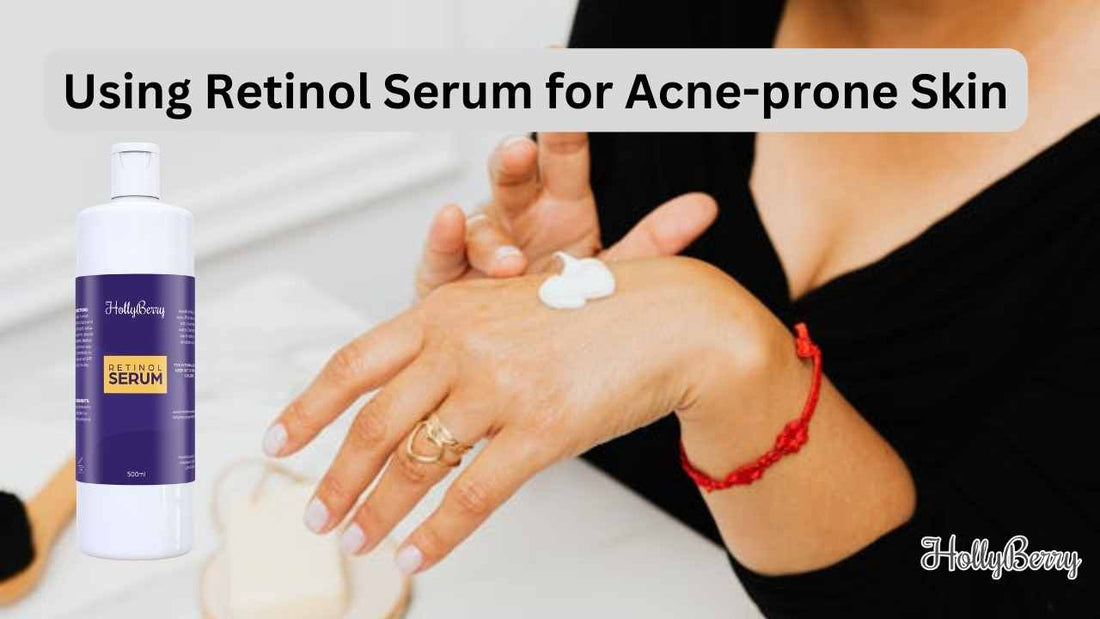
Using Retinol Serum for Acne-prone Skin
Share
Expert Tips and Benefits

Retinol serum has become an increasingly popular choice in the world of skincare, particularly for those with acne-prone skin.
Derived from vitamin A, retinol is a powerful ingredient that offers various benefits in managing and preventing breakouts. It is widely regarded for its ability to unclog pores, reduce sebum (oil) production, improve skin texture, and minimise enlarged pores.
Acne sufferers can greatly benefit from incorporating retinol serum into their skincare routines. Retinol works on the skin's outermost layer, known as the epidermis, by exfoliating and removing dirt, dead skin cells, and oil from pores. This diminishes the chances of acne forming in the first place, while also helping to clear existing acne scarring.
However, it is crucial to remember that retinol can cause side effects, such as extreme dryness, peeling, redness, and irritation, particularly in individuals with sensitive or dry skin.
To maximise the effectiveness of retinol for acne, it is important to select the right product and use it in moderation. Prescription-grade retinoids, such as tazorac and tretinoin, are considered the most potent options available for treating acne.
However, for those seeking a milder alternative, over-the-counter retinol serums can still provide significant benefits in combating acne and promoting healthier skin.

500ml Retinol serum on sale now
Understanding Acne and Retinol
How Acne Develops and the Role of Pores
Acne is a common skin condition that occurs when hair follicles become clogged with oil (sebum) and dead skin cells.
Pores, which connect hair follicles to the sebaceous glands, play a significant role in the development of acne. When sebum production increases, it can lead to the formation of a plug, known as a comedone, in the pore.
This can cause the pore to become inflamed and result in different types of acne, such as whiteheads, blackheads, and pimples.
Factors that can contribute to acne development include:
- Hormonal changes (e.g. puberty, menstruation)
- Excess sebum production
- Build-up of dead skin cells
- Bacteria (e.g. Propionibacterium acnes)
The Science of Retinol and Its Impact on Skin
Retinol, a form of vitamin A, is a popular ingredient in skincare products, especially those targeted towards acne-prone skin. Retinoids, which include retinol, are known to have multiple benefits for the skin. Here's how retinol impacts the skin and helps to combat acne:
- Cell turnover: Retinol encourages cell turnover, thereby promoting the shedding of dead skin cells. This reduces the likelihood of clogged pores and acne formation.
- Collagen production: Retinol stimulates collagen production, which helps to maintain skin elasticity and reduce the appearance of pores and acne scarring.
- Anti-inflammatory properties: Retinol possesses anti-inflammatory properties that can help to reduce the redness and swelling associated with acne.
- Sebum regulation: Some studies suggest that retinol can help to regulate sebum production, preventing excess oil from clogging pores.
Retinol serum, which typically combines retinol with other beneficial ingredients such as niacinamide and ceramides, can be particularly effective for acne-prone skin.
However, it's important to keep in mind that retinol can cause side effects, especially for those with sensitive or dry skin. These may include dryness, peeling, redness, irritation, skin scaling and stinging, and increased sensitivity to sunlight.
To minimise side effects, it's recommended to start with a low concentration of retinol and gradually increase its strength as the skin adjusts. Always wear sunscreen during the day to protect your skin from the sun while using retinol products.
And remember that patience is key – it may take several weeks to see significant improvements in acne and overall skin appearance.
Applying Retinol Serum for Acne Control
Choosing the Right Retinol Serum for Your Skin Type
When selecting a retinol serum for acne treatment, it is crucial to consider your skin type and consult a dermatologist if necessary. Retinol serums are available in various strengths, with some being prescription-strength for more severe cases.
If you have sensitive skin, opt for a formulation with a lower concentration to minimise the risk of irritation. Additionally, look for products that contain ingredients like ceramides, niacinamide, and hyaluronic acid to help balance, repair, and hydrate the skin.
Step-by-Step Guide to Incorporating Retinol into Your Routine
- Cleanse: Begin by gently cleansing your face to remove dirt, oil, and other impurities.
- Apply a small amount of retinol serum: Start with a pea-sized amount and gradually increase usage as your skin becomes more tolerant.
- Layer with a moisturiser: Apply a moisturiser after the retinol serum to prevent dryness or peeling. Choose one that is non-comedogenic and specifically formulated for acne-prone skin.
- Incorporate sunscreen during daytime: As retinol can increase skin sensitivity to the sun, ensure you apply a broad-spectrum sunscreen with an SPF of at least 30 during the day.
- Finally, it is advised to use retinol serums as part of your night-time skincare routine due to its potential for photosensitivity.
Remember, consistent and nightly use of retinol, typically for about four to six weeks, is necessary to observe its full benefits.
Potential Side Effects and How to Mitigate Them
Some common side effects of using retinol serums for acne control can include irritation, redness, and peeling. To minimise these effects, consider the following tips:
- Gradually introduce retinol into your skincare routine, initially using it every few nights before increasing frequency.
- Utilise the buffering technique: sandwich the retinol serum between two layers of moisturiser to help minimise potential irritations.
- Pay attention to your skin's reaction. If redness and irritation persist, stop using the serum and consult a dermatologist for further assistance.
